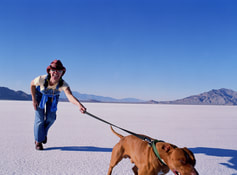Why Some Dogs Misbehave
Excerpted from the book "Dogwatching" written by Desmond Morris

"Most domestic dogs fit into human family life extremely well, but occasionally a dog becomes a troublemaker. He bites visitors without provocation, urinates in the house, and stubbornly refuses to obey orders. On a family outing it is he who takes his owner for a walk rather than the other way around. He stops when he feels like it and moves on when the mood takes him. All attempts to tug him along on his lead are vigorously resisted. At feeding time he may ignore his bowl and have to be tempted with special tidbits.
How does a pet dog develop this type of personality?
The answer is painfully obvious, although the owners of such dogs are reluctant to accept it. The fact is that dogs of this kind have simply been allowed to become the dominate members of their "pack".
Each wolf tries to achieve this status in a wild pack, and domestic dogs are no different in this respect. Humans have a great advantage over their dogs in the dominance stakes, because they are physically larger, but if the animals are unduly pampered they will make a bid for pack leadership. If they win one confrontation after another they eventually arrive at the conclusion that they are indeed now the dominate members of the group.

This need not involve actual fights with their owners. A confrontation can be won simply because the dog manages to overrule his human companions when they wish to do one thing and he insists on doing something else. After a long string of such "wins," the dog considers he is dominate and then starts to behave accordingly. This includes urinating inside the house to show that it is his territory, and making all decisions about "what happens next" when out for a walk.
This is not abnormal behavior. It is perfectly natural for a dominate animal to take the lead. So he finds it hard to understand why his decisions about starting and stopping should be challenged. Also, one of his leadership duties is defending his subordinates (that is, his human companions) against attack from strangers. Hence his assaults on postmen, milkmen and other visitors...................."
Above, as Morris concludes, is where obedience training helps to set things right again. Morris ends his chapter by saying: "The secret where dogs are concerned is to aim at a happy medium -- to balance ultimate control with as much freedom as possible".
This is not abnormal behavior. It is perfectly natural for a dominate animal to take the lead. So he finds it hard to understand why his decisions about starting and stopping should be challenged. Also, one of his leadership duties is defending his subordinates (that is, his human companions) against attack from strangers. Hence his assaults on postmen, milkmen and other visitors...................."
Above, as Morris concludes, is where obedience training helps to set things right again. Morris ends his chapter by saying: "The secret where dogs are concerned is to aim at a happy medium -- to balance ultimate control with as much freedom as possible".
And At Rapid Results Dog Training we couldn't agree with him more!





